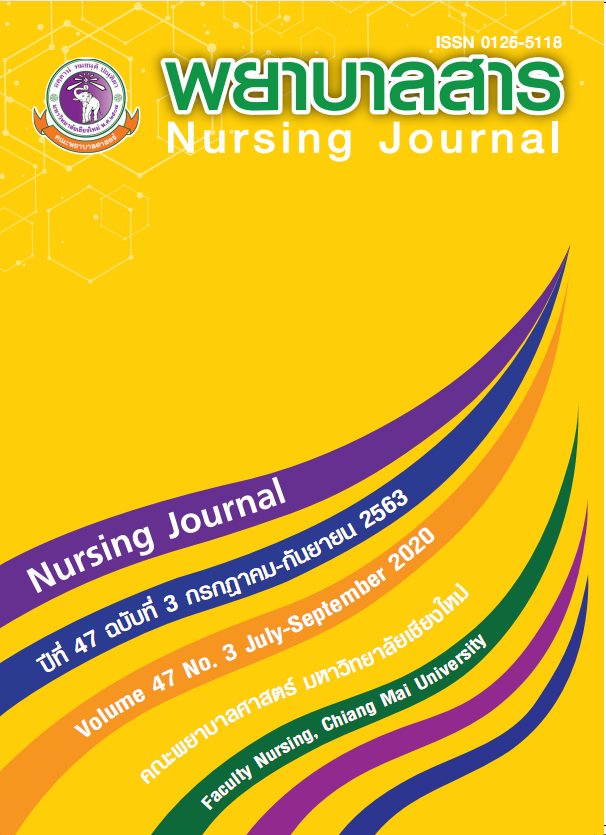Factors Related to Uncertainty in Illness Among Caregivers of Children with Seizures
Keywords:
Related factor, Uncertainty in illness, Caregiver, Children with seizureAbstract
Caregivers of children with seizures may experience uncertainty in illness. This correlational descriptive study aimed to describe the uncertainty, and factors related to uncertainty in illness among caregivers of children with seizures. The sample consisted of 85 caregivers of children with seizures aged 1 month to 15 years at the outpatient department, Maharaj Nakorn Chiang Mai Hospital between July and August 2019, who met the eligibility criteria. The research instruments included; the Parent Perception of Uncertainty in Illness Scale, the Knowledge about Convulsion Questionnaire, the Social Support Scale (The reliability of the instruments were .87, .80, and .81 respectively), and the Severity of the Illness Questionnaire. Data were analyzed using descriptive statistics, Pearson’s product moment correlation coefficient, and Spearman’s rank-order coefficient.
The study results revealed that:
- Overall, caregivers of children with seizures had a moderate level of uncertainty about regarding their children’s illness ( = 87.86, SD =12.32), as well as in each dimension of uncertainty; Ambiguity about the illness state ( = 37.93, SD = 5.95); lack of clarity about the illness state (= 24.83, SD = 5.32); lack of information about an illness, its treatment and management ( = 15.06, SD =2.35); and unpredictability of the course of the illness course and prognosis ( = 10.07, SD =2.80).
- There were significant low negative relationships between uncertainty dimension 2 (lack of clarity about the state of the illness) with knowledge about convulsions and social support (r = - 0.21, p < .05 and r = - 0.29, p < .01 respectively). There were significant moderate negative relationships between social support and uncertainty overall, as well as between social support and uncertainty dimension 1 (ambiguity concerning the state of the illness), (r = - 0.36, p < .01 and r = - 0.38, p < .01 respectively).
The results of this study provide basic information that nurses should evaluate and reduce uncertainty levels in Illness among caregivers of children with seizures, including providing seizures knowledge and social support for caregivers in order to help them feel less uncertain in the illness.
References
Chung, B., Wat, L. C., & Wong, V. (2006). Febrile seizures in southern Chinese children: Incidence and recurrence. Pediatric Neurology, 34(2), 121-126.
Flury, T., Aebi, C., & Donati, F. (2001). Febrile seizures and parental anxiety: does information help?. Swiss Med Wkly, 131(37-38), 556-560.
Friedman, M. J., & Sharieff, G. Q. (2006). Seizures in children. Pediatric Clinics of North America, 53 (2), 257-277.
House, J. S. (1981). Work stress and social support. MA: Addison-Wesley.
Huang, M-C., Huang, C-C., & Thomas, K. (2006). Febrile convulsions: Development and validation of questionnaire to measure parental knowledge, attitude, concerns and practices. Journal of the Formosan Medical Association, 105 (1), 38-46.
Kanemura, H., Sano, F., MiZorogi, S., Tando, T., Sugita, K., & Aihara, M. (2013). Parental thoughts and actions regarding their child’s first febrile seizure. Pediatrics International, 55(3), 315-319.
Kapun, K., Kanthawang, S., & Jintrawet, U. (2007). Participation in child care among caregivers ofchildren in pediatric intensive care unit and related factors. Nursing Journal, 37 (3), 62-75. (In Thai)
Kayserili, E., Unalp, A., Apa, H., Asilsoy, S., Hizarcioglu, M., Gulez, P., & Agin, H. (2008). Parental knowledge and practices regarding febrile convulsions in Turkish children. Turkish Journal of Medical Sciences, 38(4), 343-350.
Kerr, C., Nixon, A., & Angalakuditi, M. (2011). The impact of epilepsy on children and adult patients’lives: Development of a conceptual model from qualitative literature. Seizure, 20(10), 764-774.
Lamchang, S., Sriboonyawattana, N., Nuglor, T., & Lamchang, P. (2015). Factors related to parental practices for n children with febrile convulsion. Nursing Journal, 42 (Supplement November), 161-177. (In Thai)
McNelis, A. M., Buelow, J., Myers, J., & Johnson E. A. (2007). Concerns and needs of children with epilepsy and their parents. Clinical Nurse Specialist, 21(4), 195-202.
Mishel, M.H. (1983). Parents, perception of uncertainty concerning their hospitalized child. Nursing Research, 32 (6), 324-330.
Mishel, M.H. (1988). Uncertainty in illness. Image: the Journal of Nursing Scholarship, 20 (4), 225-232.
Mishel, M.H. (2014). Theories of uncertainty in illness. In Smith, M. J., & Liehr, P. R. (Eds.), Mid-dle rangetheory for nursing (pp. 53-86). New York: Springer Publishing company.
Mu, P.F. (2005). Paternal reactions to a child with epilepsy: uncertainty, coping strategies, and depression. Journal of Advanced Nursing, 49(4), 367-376.
Murry, J. (1993). Coping with the uncertainty of uncontrolled e pilepsy. Seizure, 2 (3), 167-78.
Polit, D. F. (2010). Statistics and data analysis for nursing research (2nd ed.). Boston: Pearson.
Ministry of Public Health, Strategy and Planning Division is the center of the administration. (2019). Public Health Statistics. A.D. 2017. Retrieved from http://bps.moph.go.th/. (In Thai)
Suwanosoth, S. (2004). Uncertainty, social support, and coping strategies among parents of children with cancer (Ph.D. dissertation, Chiangmai University). (In Thai)
Unwong, K. (Ed.). (2016). Clinical practice guidelines for epilepsy. Bangkok: Thana.
Wattana, S., Jintrawet, U., & Lamchang, S. (2018). Factors related to family management in familieshaving children with congenital heart disease (Master's thesis, Chiangmai University). (In Thai)
Webster, M. (2019). The cycle of uncertainty: Parents’ experiences of childhood epilepsy. Sociology of Health & Illness, 41 (2), 205-218. doi:10.1111/1467-9566.12815.
World Health Organization. (2019). Epilepsy: Key fact. Retrieved from https://www.who.int/en/news-room/fact-sheets/detail/epilepsy.
Yagil, D., & Skura-Elimeleh, Y. (2012). The impact of child and mother's characteristics on the adjustment of children with epilepsy. Vulnerable Children and Youth Studies, 7 (2), 174-185.
Downloads
Published
How to Cite
Issue
Section
License
บทความที่ได้รับการตีพิมพ์เป็นลิขสิทธิ์ของวารสารพยาบาลสาร
ข้อความที่ปรากฏในบทความแต่ละเรื่องในวารสารวิชาการเล่มนี้เป็นความคิดเห็นส่วนตัวของผู้เขียนแต่ละท่านไม่เกี่ยวข้องกับมหาวิทยาลัยเชียงใหม่ และคณาจารย์ท่านอื่นๆในมหาวิทยาลัยฯ แต่อย่างใด ความรับผิดชอบองค์ประกอบทั้งหมดของบทความแต่ละเรื่องเป็นของผู้เขียนแต่ละท่าน หากมีความผิดพลาดใด ๆ ผู้เขียนแต่ละท่านจะรับผิดชอบบทความของตนเองแต่ผู้เดียว






